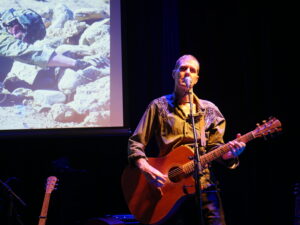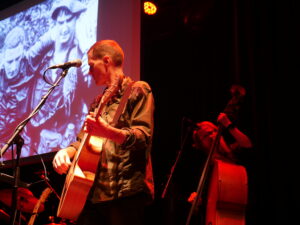Paddo RSL, August 15
8.5/10
August 15 marked not only the 80th anniversary of the end of World War II, but also four years since the fall of Kabul. Fred Smith saw the potential in tying these two events together, and strengthening the knot with songs and stories from other conflicts to create an epic show called Unforgotten: Songs of Australians at War.
Smith knows more about this subject than most songwriters, having been the first Australian diplomat deployed to Afghanistan’s Uruzgan province during that interminable war. There he socialised with soldiers who were suddenly in a metal coffin rather than the canteen, and with others who went home with parts missing.

One left the show feeling shaken rather than stirred. Smith doesn’t deal in glory any more than he proselytises, but he does deal in hard-edged realities and diverse emotions. Beyond his own acoustic guitar and occasional banjo, the songs were accompanied by an expert band and by streams of images on a big screen, some of which were harrowing enough without a word of commentary.
He began with Henry Lawson’s bitter narrative poem of the First World War, Scots of the Riverina (set to music by John Schumann), Smith’s four-piece band displaying an exemplary sense of how to maximise drama and restraint simultaneously. This flowed into the racking despair of Eric Bogle’s And the Band Played Waltzing Matilda, about Gallipoli.
Via his own Say a Prayer, telling of a sailor aboard HMAS Canberra, which was sunk in the Solomons during WWII (and which featured a twilit guitar solo from Dave O’Neill), Smith dug deep into Schumann’s I Was Only Nineteen. This Vietnam setting was sustained through Don Walker’s Cold Chisel hit, Khe Sanh, rendered so different by Smith’s light tenor, with its edge of vulnerability, rather than Jimmy Barnes’ gravelly screech.

Thereafter Smith concentrated on his own material: songs such as Dust of Uruzgan which, crucially, are entirely worthy of standing beside Bogle’s and Schumann’s. Just as important were the stories behind the songs, with Blue Guitar, for example, spawned by Smith’s time monitoring peace in the Solomons in 2000, and the rest drawing on his time in Afghanistan.
Smith has a knack of talking about political decision-making as an impartial historian, while, simultaneously, his unique set of experiences made us feel privy to the inside story. He was, of course, appalled by the handling of Kabul’s evacuation, yet thought the international mission (or invasion) had been worthwhile, given, for instance, the number of school students increasing nine-fold over its duration.
Always there was humour to balance the horrors, and even a good side to be found in war: the camaraderie, as related in Taliban Fighting Man. Smith’s ultimate triumph is that, despite all he’s witnessed in the way of miseries and ineptitude, he’s not become cynical, but maintains a faith in humanity that infused the whole – slightly long – night.